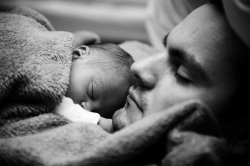
Like adults babies regularly experience stress. However, unlike adults infants cannot regulate themselves independently and they use their caregivers to modulate stress. An attuned and consistent caregiver helps create a secure attachment. This allows the baby to feel loved and loveable and creates a good attachment-exploration balance. The caregiver provides a secure base from which the infant can safely explore the world and a base to which the infant can retreat under conditions of perceived threat. When under perceived threat the infant can approach the caregiver and the caregiver can respond appropriately to help dissipate the infant's stress.
However, an consistently-inconsistent and insensitive caregiver may create more stress for their baby. Repeated and prolonged stress in infancy - in the case of insecure attachment - can lead to maladaptive biological responses to stress in the child in their infancy and later on. Insecure attachment (in comparison to secure attachment) has been linked to more medical problems in childhood as well as conditions such as anxiety, depression and aggression in adulthood.
Parenting that promotes secure attachment can effectively reduce health and mental health problems in infancy and later on. Very small changes to parenting can assist in creating secure attachment. The following video explains attachment further and suggests specific changes in parenting that can promote this security.



 RSS Feed
RSS Feed